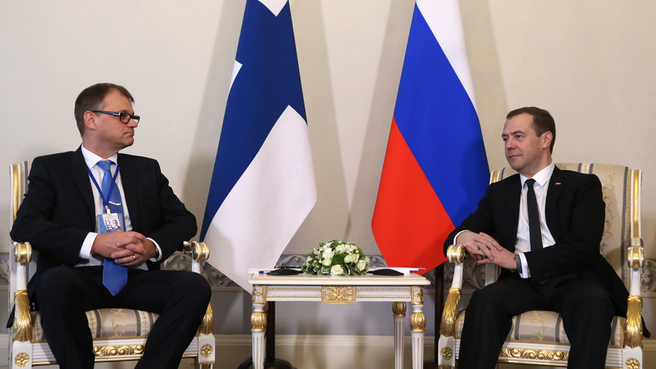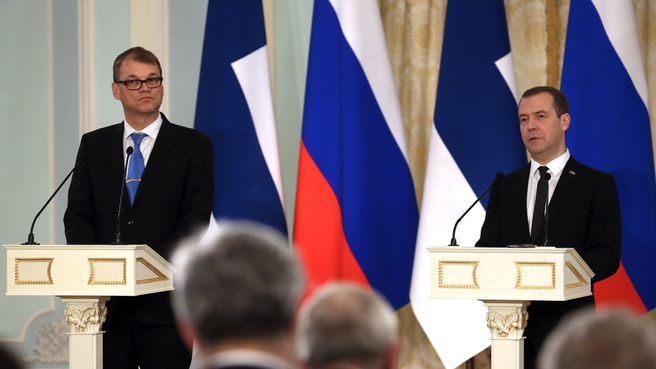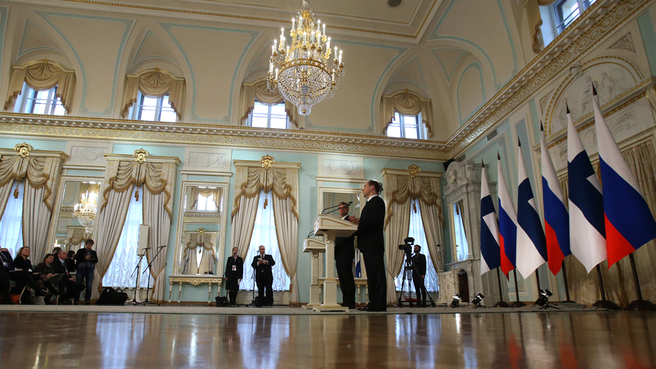Dmitry Medvedev met with Finnish Prime Minister Juha Sipilä.
Dmitry Medvedev’s conversation with Finnish Prime Minister Juha Sipilä
Dmitry Medvedev’s conversation with Finnish Prime Minister Juha Sipilä
Transcript of opening remarks:
Dmitry Medvedev: Mr Prime Minister, I’m pleased to welcome you to St Petersburg. These are our first face-to-face talks although we’ve talked on the phone. There have not been talks between our governments for a long time, for various well-known reasons, so this is a good opportunity to exchange our opinions on Russian-Finnish interaction and certain issues on the international agenda. Welcome.
Juha Sipilä (via interpreter): Mr Prime Minister, last summer I received your invitation to visit. I’m pleased to be here now. The world and the circumstances around us confront us with formidable challenges and objectives, and under these circumstances, it is very important for us to maintain contact.
As you said, we have a lot of bilateral and multilateral issues on the agenda that we need to address. Thank you again for your invitation.
Dmitry Medvedev: Kiitos! (Thank you in Finnish).
<…>
Joint news conference by Dmitry Medvedev and Finnish Prime Minister Juha Sipilä following Russian-Finnish talks
Dmitry Medvedev: Good afternoon, colleagues, journalists. I would like to start by briefly summing up our talks with Finnish Prime Minister Mr Sipilä.
Let me tell you right away that we had a good conversation, confirming our mutual commitment to developing bilateral ties.
Russia’s relations with Finland are defined by the fact that we are close neighbours and partners. I think maintaining a dialogue that is not just efficient, but regular, is what matters most and has great importance in terms of enhancing our ties.
Unfortunately, economic cooperation is not at its best with a 40-percent decline in trade.
There are two reasons for this… The first consists of declining hydrocarbon prices and is thus objective in character and has to do with the economy. The second is subjective. I’m talking about the economic sanctions that have dealt a severe blow to trade and economic cooperation between our countries.
As I’ve told my colleague today: It’s unclear for me if anyone will benefit from this. Maybe there are countries that could benefit, but it surely does nothing to help either Russia or Finland.
We agreed to resume the operations of the intergovernmental commission as a mechanism for developing ties. That said, our investment and business projects are on track despite a challenging environment, which is, of course, very important. For example, there is a project in the nuclear industry. Russia’s United Shipbuilding Corporation is working at Helsinki docks, and there are a number of other Russian projects being implemented. On the other side of the border, some 650 Finnish companies are operating in various sectors, including timber processing, construction, the food industry and a number of sectors. There are also major projects like the one implemented by the Fortum energy company.
There are other promising areas as well, such as agro-processing and high technology. Our Finnish partners have made substantial progress in these areas lately. Specifically, I’m referring to the pharmaceutical industry. We are prepared to promote other areas as well, including cross-border and interregional cooperation. All these initiatives remain on the agenda. The same goes for projects in education, science and culture. We agreed to keep this dialogue alive within the intergovernmental commission, on the ministry and agency level, and, finally, between prime ministers.
We also discussed complex international issues such as the Syria settlement, migration issues in Europe, developments in Ukraine, and some other topics. It goes without saying that this exchange was also useful.
In conclusion, I would like to thank my Finnish colleague for these substantial and constructive talks. I’m confident that the results will help strengthen cooperation between our countries.
Juha Sipila: Thank
you. Dear colleagues and representatives of the media,
My goal during my first year as the Prime Minister of Finland is to meet with all my counterparts from neighbouring countries. Today it was a special pleasure for me to meet with Russian Prime Minister Mr Medvedev here in St Petersburg, a city which is traditionally important and close to Finland.
As my colleague said, we had good constructive talks on our bilateral relations, Ukraine, relations between the EU and Russia, and the international situation.
As you said, Russia is an important trade partner for Finland in spite of the reduced trade turnover due to the global business climate and international political situation.
Russians make up a big group of tourists in Finland and Finland invests in the development of tourism. We warmly welcome Russian tourists in Finland.
I also met with representatives of Finnish companies here. As my colleague said, hundreds of Finnish companies do business in various fields in Russia and most of these companies remain on the Russian market in spite of having to adapt their activities to the changing economic situation. Business environment activities and unimpeded foreign trade operations are important on the Russian market, like everywhere else. And Finnish companies persevere in this context.
Mr Medvedev and I also discussed the situation on our common border. We have a long common border and its good performance ensures vigorous contacts and cooperation between our citizens and economic structures and companies. Finland is adequately ensuring the border’s reliability and security. At the same time, we are carrying out with responsibility our task of protecting the EU’s external frontier.
At present, the situation is fairly satisfactory. Shutting down channels of illegal migration meets the interests of both countries. By pooling our efforts we can prevent the emergence of different problems and threats for the domestic security of our countries. We share an opinion on the need to find a stable solution for this issue. The competent Finnish and Russian authorities continue their traditionally good cooperation and dialogue. We believe it is necessary to find both short- and long-term solutions. Therefore, we agreed to continue our discussions over the phone in the near future.
As my colleague already said, we have discussed the situation in Ukraine. Finland is fully committed to the common foreign policy of the EU, including sanctions that are conditioned by the circumstances and the Ukraine crisis.
We also discussed the implementation of the Minsk agreements. Naturally, it plays a major role in the development of EU-Russia relations.
Importantly, we continue our active cooperation at different regional forums. In October 2015, Finland transferred its chairmanship of the Barents-Euro Arctic Council to Russia. In 2016, Finland will chair the Nordic Council of Ministers. We are also getting ready for Finland’s Chairmanship of the Arctic Council in 2017.
The current world situation is facing us with many challenges and tasks. Cooperation is a must. For instance, we must cooperate on Syria. A settlement in Syria is mainly important for Syrians but it also matters for the stability in the Middle East. Moreover, the situation there is also affecting our region, the North of Europe.
Mr Prime Minister, I’d like to thank you again for our constructive conversation and such a good start of our dialogue. I’d like to repeat on the record my invitation to you to visit Finland.
Excerpts from replies to
questions by journalists
Dmitry Medvedev: Naturally, despite all of the difficulties and sanctions we remain large trade partners because we are neighbours and have a long, eventful history of investment and trade cooperation, not to mention history in general.
Needless to say, sanctions have spoilt our cooperation in many spheres and industries, but we didn’t invent them and it’s not up to us to cancel them.
As for several large, important projects, they are not covered by sanctions – either those adopted by the European Council or the countermeasures of the Russian Federation. So, the implementation of such major projects as the construction of the nuclear power plant – is proceeding as scheduled. At present, its builders are going to work on the construction site.
Nord Stream 2 is also a large project. This is essentially a commercial project, no matter how some commentators would like to interpret it. This is a normal business project and it was planned as such by the Russian side, Russian companies, primarily Gazprom and its European partners. This is how we want to carry it out. As far as I understood the position of my colleague, Finland also interprets this project as a strictly commercial one. Considering our experience working with Nord Stream 1, we intend to continue our cooperation based on this approach.
Juha Sipilä: Needless to say, sanctions have affected our bilateral trade. We discussed a whole number of projects, including the construction of the Hankihivi nuclear power plant. We discussed the current status of this project and the construction of the gas pipeline, which is part of it. Finland expects the European Commission to give a legal assessment of the project. For Finland this is a commercial project and we are pragmatic about it.
Dmitry Medvedev (about the recent problems on the Russian-Finnish border): What is happening there is not at all a consequence of Russian policy. This is the result of many circumstances, including the EU’s short-sighted migration policy. Finland has become a hostage to it. But nothing like this would have happened if it had not been for the events that detonated the general situation in Syria, Libya and some other countries.
We always maintained proper border cooperation and had the right contacts. We agreed to continue working on it with the Finnish prime minister. The border services will continue their cooperation.
This kind of migration is dangerous not only for Finland but also for the Russian Federation because all talk about this being part of our foreign policy or an orchestrated effort is sheer nonsense.
The European Union should decide for itself what migration policy it will conduct.
With regard to migrants who arrived from the Russian territory (and we cannot stop their movement because it is based on the European Convention on Human Rights and the Russian Constitution), their number does not exceed 1,000, while 30,000 people have arrived in your country from Sweden.
The problem stems from the Middle East and, naturally, from the rules and procedures adopted by the European Union. My colleague and I discussed this in detail and agreed to continue contacts on this subject.
Juha Sipila (on Finland’s decision to extradite Russian citizens Maxim Senakh and Alexander Sergeyev to the United States): Finland deals with such problems in accordance with bilateral and multilateral agreements and conventions that are obligatory for us. In this case we deal with independent judiciary legal processes concerning certain private individuals. Relevant contacts between Russia’s and Finland’s competent authorities are well established and they are working on this issue. There were cases when Finland extradited individuals for legal prosecution in Russia at Russia’s request and there were other cases when it was established as a result of court proceedings that there were no reasons to extradite a Russian citizen to a third country.
Dmitry Medvedev: An extradition treaty and a mutual legal assistance treaty do not only bind Finland and the United States; there is also an agreement between Russia and the United States. For some reason, the Americans did not approach us about these individuals, whom they consider to be criminals, but decided to get to them through a third country. This illustrates the general practice of the US justice system, which considers itself to be global and believes that it can make decisions concerning any citizen of any country, such as having a suspect handed over to them, kidnapping and bringing him to the United States for a court trial. This is immoral and looks like international criminal behaviour, especially between countries bound by bilateral mutual legal assistance treaties, in this case Russia and the United States.
The Americans behave with a growing impudence in this respect. I am referring to absolutely ordinary events. The crimes these individuals are charged with do not qualify as grave offences, although according to the US law, defendants can receive prison terms exceeding 100 years for them. Even from the humanitarian standpoint, extradition to the US cannot be considered fully justified in this case.
As for contacts between law enforcement agencies of our two countries in the framework of the existing agreements, we are going to use all these channels together with our Finnish partners.
Dmitry Medvedev (about re-establishing Russian-Finnish trade and economic relations): We have conducted comprehensive talks to improve these relations and return them to the level we enjoyed earlier.
It was not through our fault that these relations were undermined; we did not cause this mess. We are prepared to re-establish the full range of our ties. The main thing is for all our partners to hear this, including those who are sitting in conference in Brussels. As soon as necessary decisions are made, relations with Finland will return to their normal state, in terms of the volumes and areas of trade cooperation. This should be our mutual goal.
This period will inevitably come to an end, just as those ten kinds of sanctions that were imposed against the Soviet Union in the 20th century. And Russian-Finnish cooperation will remain, just like our good neighbourly relations.
Juha Sipila: Developing trade and economic relations between our countries is very important for us and we are looking for areas of cooperation and opportunities outside the domain of the sanctions.
Today we also discussed some concerns expressed by Finnish companies. We agreed that co-chairpersons of the Intergovernmental Commission for Economic Cooperation will meet in the near future, and this meeting will outline further steps in the development of these ties.
We made a joint statement that communication and cooperation on our border has been very good for many decades. The problems associated with migration issues are very complicated and we discussed the fundamental causes of these processes. We had a very pragmatic discussion of the challenges we are facing at present. We will return to this discussion very soon – next week, in fact.














